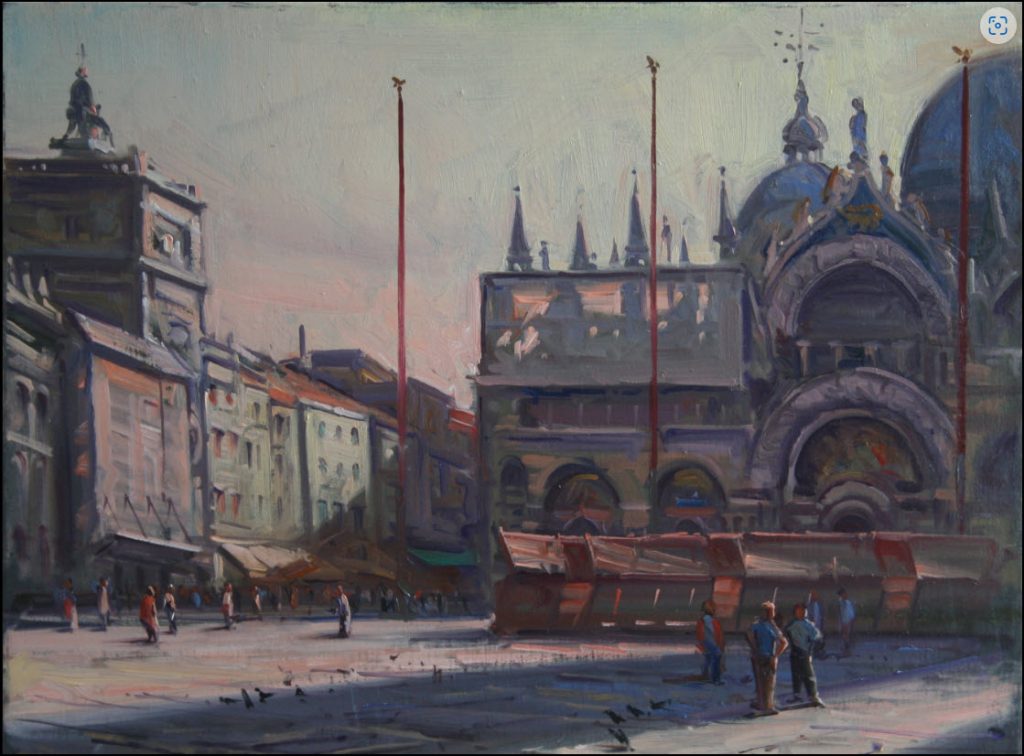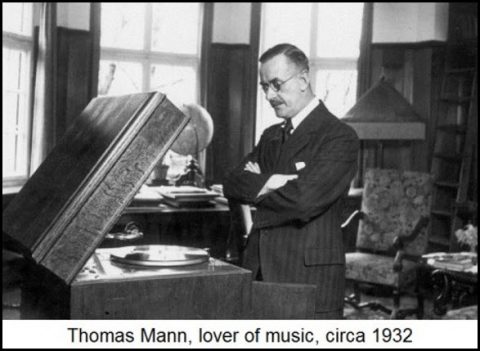July 28, 2024 | Time for a Holiday…

[I’m taking a summer break, so this will be my last commentary until after Labor Day. It will be the usual busman’s holiday, however, and actionable ‘touts’ for popular symbols will be updated ‘round-the-clock as always. Some recommendations will be accessible to non-paying subscribers, so be sure to check the home page regularly, especially if stocks go haywire. I will also continue to provide tradeable guidance and timely analysis in the chat room. To sum up the markets for now, though, let me note that the scripted savaging of the lunatic stocks (aka the egregiously misnamed ‘Magnificent Seven’) unfolded last week exactly as forecast. Now I am focused on the strong possibility that the manic bounce that has ensued will turn out to be a fake, a distribution much like the summer rally that preceded the 1929 Crash.
Concerning the illustration, it is titled ‘Restoration of St. Marco’. This work and possibly others by the same artist, Geoffrey Leckie, will be featured here while I’m on holiday. Geoff and I attended the University of Virginia and shared a farmhouse outside of Charlottesville in the late 1960s. He is a deeply gifted artist whose works, mostly oil on canvas, include landscapes, still-lifes and portraits that have always stirred me with their beauty and uncompromising style. His California seascapes are a particular favorite of mine, capturing the roughness of the Northern California coastline and the ceaseless fury of the waves. Geoff lives in Venice, Italy, but travels the world in search of inspiration. Here is a link to some of his other paintings and the galleries that represent him.
The Venetian scene is thematically tied to the literary text below, an excerpt from Thomas Mann’s magisterial The Magic Mountain. Mann considered vacations essential to restoring one’s vital energy following boring stretches on-the-job. His novella Death in Venice concerns a writer who takes a holiday to recoup his gifts, only to become fatally attracted to a young Polish boy. It is in The Magic Mountain, however, that the author deals with the weighty subject of time at the deepest level, explaining how we perceive and recall its passage, versus the way we live it. If you’ve ever wondered why a year in grade school seemed so vast, while the same, 365-day interval rocketed by in later life, a close reading of Mann’s opus will reward you with a profound epiphany. The translation, which I have published here before, is by H.T. Lowe-Porter.]
Excursus on the Sense of Time
“There is, after all, something peculiar about the process of habituating oneself in a new place, the often laborious fitting in and getting used, which one undertakes for its own sake, and of set purpose to break it all off as soon as it is complete, or not long thereafter, and to return to one’s former state. It is an interval, an interlude, inserted, with the object of recreation, into the tenor of life’s main concerns; its purpose the relief of the organism, which is perpetually busy at its task of self-renewal, and which was in danger, almost in process, of being vitiated, slowed down, relaxed by the bald monotony of its daily course. But what then is the cause of this relaxation, this slowing-down that takes place when one does the same thing for too long at a time? It is not so much physical or mental fatigue or exhaustion, for if that were the case, then complete rest would be the best restorative. It is rather something psychical; it means that the perception of time tends, through periods of unbroken uniformity, to fall away; the perception of time, so closely bound up with the consciousness of life, that the one may not be weakened without the other suffering a sensible impairment. Many false conceptions are held concerning the nature of tedium.
“In general it is thought that the interestingness and novelty of the time-content are what ‘make the time pass’; that is to say, shorten it; whereas monotony and emptiness check and restrain its flow. This is only true with reservations. Vacuity, monotony, have, indeed, the property of lingering out the movement and the hour and of making them tiresome. But they are capable of contracting and dissipating the larger, the very large time-units. to the point of reducing them to nothing at all. And conversely, a full and interesting content can put wings to the hour and the day; yet it will lend to the general passage of time a weightiness, a breadth and solidity which cause the eventual years to flow far more slowly than those poor, bare empty ones over which the wind passes and they are gone. Thus what we call tedium is rather an abnormal shortening of time consequent upon monotony. Great spaces of time passed in unbroken uniformity tend to shrink together in a way to make the heart stop beating for fear; when one day is like all the others, then they are all like one; complete uniformity would make the longest life seem short, and as though it had stolen away from us unawares. Habituation is a falling asleep or fatiguing of the sense of time; which explains why young years pass slowly, while later life flings itself faster and faster upon its course.
Reliving Youthfulness
“We are aware that the intercalation of periods of change and novelty is the only means by which we can refresh our sense of time, strengthen, retard and rejuvenate it, and therewith renew our perception of life itself. Such is the purpose of our changes of air and scene, of all our sojourns at cures and bathing resorts; it is the secret of the healing power of change and incident. Our first days in a new place, time has a useful, that is to say, a broad an sweeping, flow, persisting for some six or eight days. Then, as one ‘gets used to the place,’ a gradual shrinkage makes itself felt. He who clings or, better expressed, wishes to cling to life, will shudder to see how the days grow light and lighter, how they scurry by like dead leaves, until the last week, of some four, perhaps, is uncannily fugitive and fleet. On the other hand, the quickening of the sense of time will flow out beyond the interval and reassert itself after the returns to ordinary existence: the first days at home after the holiday will be lived with a broader flow, freshly and youthfully — but only the first few, for one adjusts oneself more quickly to the rule than to the exception; and if the sense of time be already weakened by age, or — and this is a sign of low vitality — it was never very well developed, one drowses quickly back to the old life, and after four-and-twenty hours it is as though one had never been away, and the journey had been but a watch in the night.”
STAY INFORMED! Receive our Weekly Recap of thought provoking articles, podcasts, and radio delivered to your inbox for FREE! Sign up here for the HoweStreet.com Weekly Recap.
Rick Ackerman July 28th, 2024
Posted In: Rick's Picks
Next: A Sticky Last Mile »













